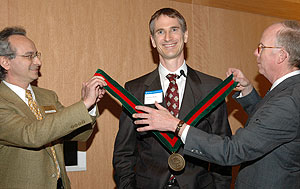Michael R. Brent, Ph.D., was installed as the Henry Edwin Sever Professor of Engineering in a recent ceremony in the Uncas A. Whitaker Hall for Biomedical Engineering Auditorium.
Brent, professor of computer science and engineering in the School of Engineering & Applied Science, was born in Detroit.

He earned three degrees from Massachusetts Institute of Technology: a bachelor’s in mathematics in 1985, a master’s degree in computer science in 1988 and a doctorate in computer science in 1991.
His doctoral dissertation provided one of the early successes in using statistical methods for machine learning of human languages, an approach that is now dominant in the field of computational linguistics.
During graduate school, he developed an interest in molecular biology and its technological potential. In 1988, he participated in a five-week workshop that assembled researchers in computer science and biology at the Santa Fe Institute.
Upon returning to MIT, he took biochemistry, cell and molecular biology, and immunology, satisfying the requirements for a minor concentration. His interest in biology remained active, but did not impact his professional research for another 10 years, as he returned to his work in computational linguistics.
Brent began his academic career at Johns Hopkins University in 1991 as assistant professor of cognitive science, becoming associate professor in 1997. He joined the WUSTL faculty in 1999 as associate professor of computer science with joint appointments in the departments of Biomedical Engineering in the School of Engineering & Applied Science and of Genetics in the School of Medicine. In 2004, Brent became professor of computer science and engineering.
While a Johns Hopkins University faculty member, Brent performed research on computational linguistics and psycho-linguistics, and he developed computer models of how children learn their native languages.
He brought these research interests to Washington University, and he also developed a second research program in computational biology — specifically, the computer analysis of DNA sequences.
In 2001-02, Brent phased out his research on language to focus entirely on computational genomics. He is director of the Laboratory for Computational Genomics.
Using mathematical and computational sequence analysis, Brent and his research group study the function and evolutionary dynamics of genomes. They were involved in the sequencing and analysis of the mouse, rat and chicken genomes.
Brent and his co-researchers are also working to improve genome annotation, thereby enhancing the value of genome sequences for the scientific community.
They are developing models that will allow them to predict accurately which regions of a genome are transcribed into pre-messenger RNA, how they are spliced, and which portions of the spliced transcript are translated into protein.
The researchers ultimately would like to gain insight into how the differences between genomic sequences of different species give rise to those species’ observable characteristics.
Brent is on the editorial boards of BMC Bioinformatics and Genome Research. He served as president of the Association for Computational Linguistics’ Special Interest Group on Natural Language Learning (1997-99) and was an editorial board member and guest editor of Cognition (1996-99).
The author of numerous peer-reviewed journal articles and book chapters, Brent frequently presents his work at scientific colloquia and conferences.
Brent and his wife, Tamara L. Doering, M.D., Ph.D., associate professor of molecular microbiology in the School of Medicine, are the parents of Rafael Isaac Brent, born in 2001, and Gabriel Milton Brent, born in 2004.
In his spare time, Brent enjoys dancing, international travel, creative cuisine and studying mathematics and foreign languages. He is working on keeping up with his wife and children in modern Hebrew.
Henry Edwin Sever was born in 1866, in Hurdland, Mo., and started life as a penniless farm boy. He rose to become owner and president of Riverside Publishing Co. of St. Louis and later, Chicago.
Sever amassed a fortune publishing highly popular volumes of the history of the world and the United States, book sets that were nearly indispensable to the home life of the average American family in the early 1900s.
Sever died in Chicago in 1941. His philanthropic wishes were set forth in his will and consisted mainly of three special bequests: the construction of a building to house the public library that he had organized many years earlier in Kahok in Knox County, Mo., where he was born; the development of a forest preserve and game refuge, which is now the state-owned Henry Edwin Sever Memorial Wildlife Area near Newark, Mo.; and the rest of Sever’s estate went to Washington University, making possible the construction of the 20,526-square-foot Sever Hall, which was dedicated in 1948.
In addition, the engineering graduate program became known as the Sever Institute of Technology. In 2000, this name was changed, by a vote of the University’s Board of Trustees, to the Henry Edwin Sever Graduate School of Engineering & Applied Science.
In 1994, invested funds from Sever’s estate established the Henry Edwin Sever Professorship of Engineering.